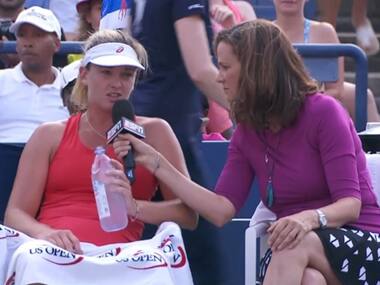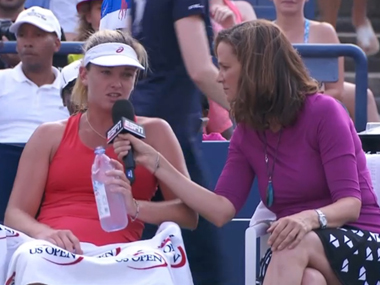By Anand Datla The relationship between sport and television is often comparable to an inconvenient marriage. While the relationship has given sport a new set of wings, it has often also threatened to consume it with its overbearing demands. On 1st September, at the first round of the year’s last grand slam, American tennis player CoCo Vandeweghe did something that created quite the buzz among her peers - she gave ESPN an interview during the first set changeover. As one watched Coco break away from her match against Sloane Stephens to answer a couple of questions to Pam Shriver, the connotations of this small but significant development were hard to miss. [caption id=“attachment_2421456” align=“alignleft” width=“380”]
 Coco Vandeweghe giving a mid-match interview to Pam Shriver in her first round match against Sloane Stephens. Screengrab[/caption] The impact of television is clear for all to see – sport has become one of the fastest growing industries globally, mainly on the power of television. As satellites carry sporting events from venues across the world to homes, thousands of miles away, there is an unprecedented appetite for televised sport. On a positive note, television has allowed several millions of people, typically far removed from the scene of action to engage themselves in an unprecedented manner. But then the cameras serve well so long as they are restrained firmly to the periphery of the action. The latest gig – a 30 second on court interview with Vandeweghe by Pam Shriver, bang in the middle of a grand slam match is a jarring note at several levels. First, this was an intrusion at the end of the first set that we could live without. The action on the court is what we ought to seek and a player’s thoughts can wait till the end of the match. Sport at the highest level is ultra-competitive and athletes can perform better if they weren’t distracted. Second, our hunger for sport is not built on any voyeuristic instinct. It is built on the premise that sport is a microcosmic reflection of life itself, offering us an undulating treat over a brief space of time. And our wisdom lies in allowing the action on court to feed our senses. Third, in allowing television to intrude the space meant for athletes even as they pursue their craft is fraught with the risk of robbing sport of its essential charm. Watching sport from a distance in a controlled setting adds to the mystique of the experience. It is important to draw a line between entertainment and sport, and even more critical to keep the two apart. Instead of lapping it up hungrily, sports lovers should heed the warning bell and sound the death knell to such antics. As it is, opinion has been divided within the sport of tennis. “Pam explained it to me herself,” said Vandeweghe, trying to explain her naiveté. “She would come out and ask me two questions. It would be in between sets. If I didn’t want her out there, I could just wave her away at any point in time. I could say it two seconds before I walked out on the court.” “But I gave her the nod to go ahead - and then it happened.” Clearly, that was a very labored explanation by a person who was struggling to find the conviction needed to defend her choices. “I don’t remember a thing I said,” added Vandeweghe, underlining the futility of the gig. “Dead serious. I don’t even remember what she asked.” And let us not shoot the messenger here – Vandeweghe was only guilty of being naïve. It is television that is complicit in this crime that threatens to sully a beautifully intense sport. Caroline Wozniacki, another player who is happy to be expressive, albeit on Twitter, took to it to share her reactions.
Coco Vandeweghe giving a mid-match interview to Pam Shriver in her first round match against Sloane Stephens. Screengrab[/caption] The impact of television is clear for all to see – sport has become one of the fastest growing industries globally, mainly on the power of television. As satellites carry sporting events from venues across the world to homes, thousands of miles away, there is an unprecedented appetite for televised sport. On a positive note, television has allowed several millions of people, typically far removed from the scene of action to engage themselves in an unprecedented manner. But then the cameras serve well so long as they are restrained firmly to the periphery of the action. The latest gig – a 30 second on court interview with Vandeweghe by Pam Shriver, bang in the middle of a grand slam match is a jarring note at several levels. First, this was an intrusion at the end of the first set that we could live without. The action on the court is what we ought to seek and a player’s thoughts can wait till the end of the match. Sport at the highest level is ultra-competitive and athletes can perform better if they weren’t distracted. Second, our hunger for sport is not built on any voyeuristic instinct. It is built on the premise that sport is a microcosmic reflection of life itself, offering us an undulating treat over a brief space of time. And our wisdom lies in allowing the action on court to feed our senses. Third, in allowing television to intrude the space meant for athletes even as they pursue their craft is fraught with the risk of robbing sport of its essential charm. Watching sport from a distance in a controlled setting adds to the mystique of the experience. It is important to draw a line between entertainment and sport, and even more critical to keep the two apart. Instead of lapping it up hungrily, sports lovers should heed the warning bell and sound the death knell to such antics. As it is, opinion has been divided within the sport of tennis. “Pam explained it to me herself,” said Vandeweghe, trying to explain her naiveté. “She would come out and ask me two questions. It would be in between sets. If I didn’t want her out there, I could just wave her away at any point in time. I could say it two seconds before I walked out on the court.” “But I gave her the nod to go ahead - and then it happened.” Clearly, that was a very labored explanation by a person who was struggling to find the conviction needed to defend her choices. “I don’t remember a thing I said,” added Vandeweghe, underlining the futility of the gig. “Dead serious. I don’t even remember what she asked.” And let us not shoot the messenger here – Vandeweghe was only guilty of being naïve. It is television that is complicit in this crime that threatens to sully a beautifully intense sport. Caroline Wozniacki, another player who is happy to be expressive, albeit on Twitter, took to it to share her reactions.
The elder stateswoman of tennis, Serena Williams, summarized it best. “That’s kind of the integrity of tennis when you think about it. It’s just you on the court,” emphasized Serena. “It’s not a reporter. It’s not a coach. It’s just you in that moment. I kind of love that. It’s the only sport where you have that.” The USTA will do well to stop pandering to the television honchos and protect the integrity and innocence of the sport and its players.
)